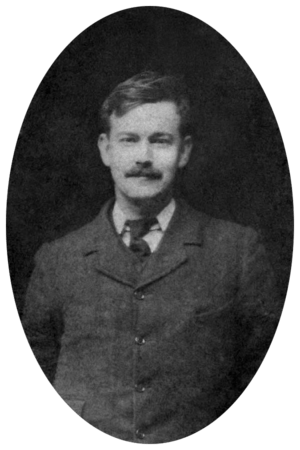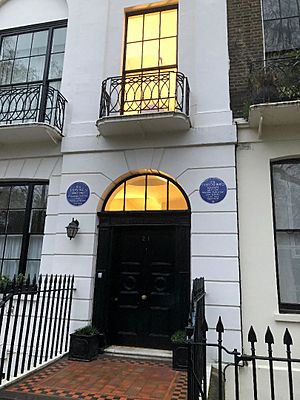R. H. Tawney facts for kids
Quick facts for kids
R. H. Tawney
|
|
|---|---|
 |
|
| Born |
Richard Henry Tawney
30 November 1880 |
| Died | 16 January 1962 (aged 81) London, England
|
| Nationality | English |
| Other names | Harry Tawney |
| Political party | Labour |
| Movement | Christian socialism |
| Spouse(s) |
Jeannette Tawney
(m. 1909) |
| Alma mater | Balliol College, Oxford |
|
Notable work
|
|
| Scientific career | |
| Institutions | London School of Economics |
Richard Henry Tawney (born November 30, 1880 – died January 16, 1962) was an English thinker. He was a historian who studied how economies changed over time. He also criticized society and believed in a type of socialism based on Christian values. Tawney was very important in helping adults get an education.
Many people say Tawney had a big impact in these areas. Some even believe he was the most influential historian of his time. He made a difference in politics, society, and especially in education.
Contents
Early Life and School
Richard Henry Tawney was born in Calcutta, British India (now Kolkata, India) on November 30, 1880. His father, Charles Henry Tawney, was a scholar who studied Sanskrit.
Tawney went to Rugby School. He started on the same day as William Temple, who later became an important church leader. They stayed friends for their whole lives. After Rugby, Tawney studied at Balliol College, Oxford University. This college taught students to help society. This, along with Tawney's strong Christian faith, made him feel responsible for helping others.
After finishing Oxford in 1903, Tawney lived at Toynbee Hall. This was a place that helped the poor and was home to the Workers' Educational Association (WEA). This experience changed him a lot. He realized that simply giving to charity was not enough. He believed that big changes were needed in society to make things fair for poor people.
Christian Beliefs and Society
Tawney went to church regularly, but he usually kept his Christian faith private. He rarely talked publicly about his beliefs. He felt that the Church of England often supported rich people and did not speak out enough for the poor. He thought the church should be more like the New Testament, which spoke plainly about justice.
From 1908, Tawney taught the first classes for the Workers' Educational Association (WEA). He taught in places like Longton and Rochdale. He also worked part-time as an economics lecturer at Glasgow University. He traveled a lot to teach his WEA classes.
Tawney saw these classes as a way for him to learn too. He said that talking with weavers, potters, miners, and engineers taught him a lot about economics and politics that he couldn't learn from books.
Service in World War I
During the First World War, Tawney joined the army as a Sergeant. He chose not to become an officer because of his political beliefs. He wanted to serve alongside regular soldiers.
At first, he was against the war. But he decided to join after hearing about terrible things happening during the German invasion of Belgium. He fought in the Battle of the Somme in 1916. He was wounded twice on the first day and had to wait in a dangerous area for 30 hours before being rescued. He was taken to a hospital in France and then sent back to Britain.
The war made Tawney think deeply about human nature. He felt that any good we achieve is fragile and needs constant effort to maintain. The war also made him feel that social, economic, and political changes were needed urgently. In 1918, he helped write a report for the Church of England called Christianity and Industrial Problems. This report had strong socialist ideas and influenced how the Anglican Church thought about society after the war.
A Respected Historian
Tawney's first important history book was The Agrarian Problem in the Sixteenth Century (1912). He worked at Balliol College from 1918 to 1921. From 1917 to 1931, he taught at the London School of Economics (LSE).
In 1926, he helped start the Economic History Society. He also became an editor for its journal, The Economic History Review. From 1931 until he retired in 1949, he was a professor of economic history at the LSE. Many universities, including Oxford and Paris, gave him honorary doctorates.
Tawney's historical work showed his strong moral beliefs. He was very interested in how land was enclosed in England in the 16th and 17th centuries. He also studied the idea that Protestantism was connected to the rise of capitalism. His ideas about the rise of the gentry (a social class) before the English Civil War caused a big debate among historians.
His most famous book was Religion and the Rise of Capitalism (1926). This book looked at how Protestant beliefs and economic growth were linked in the 16th and 17th centuries. Tawney felt sad that business and moral values became separate after the Protestant Reformation. He believed this led to people caring more about money than Christian teachings.
People who knew Tawney often said he had a special, almost holy, presence. Several places and groups are named after him, like the Tawney Society at Rugby School and the R. H. Tawney Building at Keele University.
Working for Change
Social Ideas
Two of Tawney's most important books that criticized society are The Acquisitive Society (1920) and Equality (1931). The Acquisitive Society was widely read. It criticized how modern society often focuses on selfish desires and getting more things. Tawney believed that capitalism encourages greed and harms everyone. In Equality, he argued for a society where everyone is treated fairly and has equal opportunities.
Both books showed Tawney's Christian moral values. They had a big impact in Britain and other countries. They also helped shape the idea of the Welfare state, where the government helps its citizens with things like healthcare and education. Many people saw Tawney as a strong voice against the worship of wealth.
Christian Socialist Politics
Tawney's political ideas changed a bit over time, but his main socialist beliefs stayed strong. He believed in a flexible but clear socialist way of thinking that could work in different political situations.
In 1906, Tawney joined the Fabian Society, a group that promoted socialist ideas. He was part of its leadership for many years. Another member, Beatrice Webb, called him a "saint of socialism" because he influenced people without being harsh. He joined the Labour Party in 1918. He ran for a seat in the House of Commons three times but did not win. In 1935, he turned down a chance to become a Member of Parliament. He felt he could help the Labour Party more in other ways.
Tawney worked on many government groups dealing with industry and education. In 1919, he helped write a report about the coal mining industry. He and others recommended that the coal mines should be owned by the government, not private companies.
His book Secondary Education For All (1922) greatly influenced the Labour Party's education policies for many years. He also helped write the Labour Party's plan for the 1931 election.
Helping Adult Education
Tawney used his connections with thinkers in the Labour Party to make a lasting difference in higher education. He wanted to make education available to everyone, not just a few. He worked to change how universities were structured and what they taught.
For over 40 years, from 1905 to 1948, Tawney was part of the Workers' Educational Association (WEA) leadership. He also served on several government committees about education. His ideas were very important in creating the University College of North Staffordshire, which later became Keele University. A building at Keele University was named the Tawney Building in his honor.
Death and Burial
Tawney died in London on January 16, 1962. He is buried in Highgate Cemetery.
Works
- The Agrarian Problem in the Sixteenth Century (1912)
- The Acquisitive Society (1920)
- Secondary Education for All (1922)
- Education: the Socialist Policy (1924)
- Religion and the Rise of Capitalism (1926)
- Equality (1931)
- Land and Labour in China (1932)
- Business and Politics under James I: Lionel Cranfield as Merchant and Minister (1958)
- The Radical Tradition: Twelve Essays on Politics, Education and Literature (1964)
Images for kids
See also
In Spanish: R. H. Tawney para niños
 | Selma Burke |
 | Pauline Powell Burns |
 | Frederick J. Brown |
 | Robert Blackburn |



